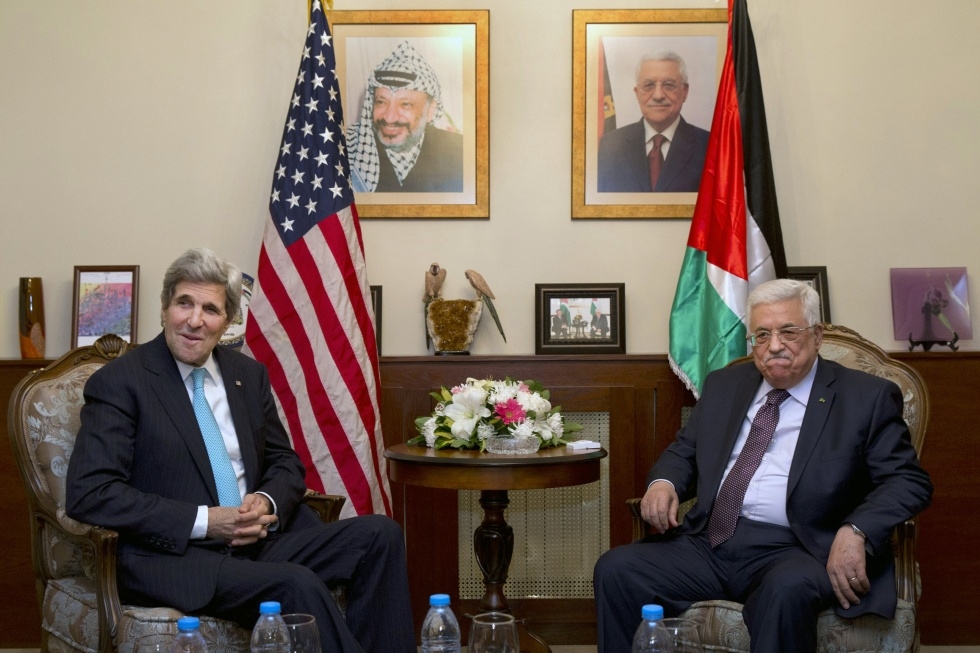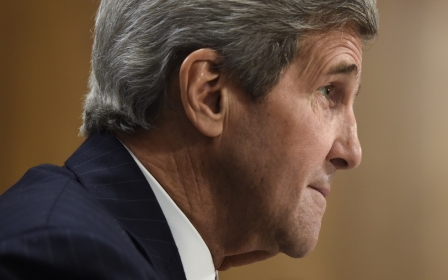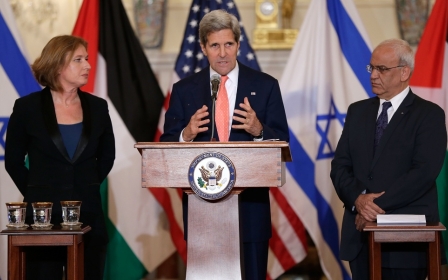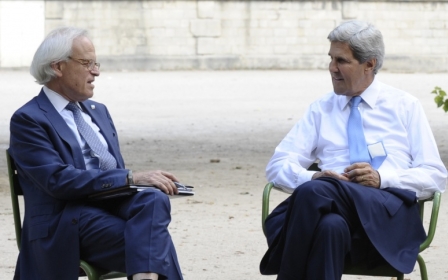Kerry concerned by Hamas government as Israeli planes strike Gaza

US Secretary of State John Kerry has voiced renewed concern about the formation of a Hamas-Fatah unity government, following a telephone conversation with Palestinian President Mahmoud Abbas.
During the call, Kerry "expressed concern about Hamas's role in any such government and the importance that the new government commit to the principles of nonviolence, recognition of the state of Israel and acceptance of previous agreements with it," State Department spokeswoman Jen Psaki said. "President Abbas assured the secretary that the new government would be committed to these principles."
Kerry also stressed that the United States would "judge any government based on its composition, policies, and actions," Psaki added in a statement. Kerry's warnings come hours after Israeli Prime Minister Benjamin Netanyahu called on the international community not to recognise the new Palestinian unity government, saying it would encourage terrorism.
Abbas said last week that the line-up of a unity government would be announced Monday, following a delay over who would head the foreign ministry. Abbas also added that the unity government would be made up of independents and would abide by his political programme.
"The main task of the government is to prepare for new election," Abbas said.
It is believed that the new government will be headed by Rami Hamdallah - the current prime minister in the West Bank – and will count a total of 17 ministers. Five of the 17 are likely to come from Gaza. Technocratic in nature, the cabinet will not have a political mandate but will rather be tasked with organising elections within six months.
Prisoner affairs
However, signs of possible conflict have lingered, with Hamas saying it would reject the formation of a national unity government which did not include a ministry for prisoners' affairs.
"Hamas' final position is that there must be a ministry for prisoners in any national accord government," Hamas spokesman Sami Abu Zuhri said in a statement late Sunday.
He added that his movement, which rules Gaza, has clarified its position on this issue to Fatah, which rules the West Bank. Khalil al-Hayeh, a member of Hamas' politburo, had earlier cautioned that the Abbas' insistance to substitute the prisoners ministry with an independent agency affiliated directly to the Palestine Liberation Organisation would delay the new government.
Fatah has yet to comment on the statement.
Tension over the deal have also been hightened with Israel reportedly preventing three Gazans from travelling to the West Bank over the weekends be sworn in as ministers.
In late April, Hamas and Fatah hammered out a reconciliation deal with a view to ending the rifts that have marred their relations since 2007. The deal stipulates the formation of a national unity government to serve until legislative and presidential polls can be held in the West Bank and the Gaza Strip.
Peace talks between Israeli and Palestinian negotiators – which resumed in Washington last July after a nearly three-year hiatus – collapsed in April.
The talks hit a snag in March after Israel refused to release 26 Palestinian prisoners, despite earlier pledges to do so. Abbas retaliated by formally applying for Palestinian membership in 15 UN conventions and agencies.
Israel has since announced a raft of punitive measures to be taken against the Palestinians after Abbas' Fatah movement.
Clashes
The situation has been further destabilised by a flare up in violence. Rocket fire from Gaza and Syria hit Israel early on Monday in two separate incidents that prompted the Israeli military to hit back.
In the early morning hours, Israeli warplanes staged two bombing raids on targets in central and southern Gaza, following rocket fire on southern Israel, a spokesman said.
"After two rockets were fired at Israeli territory over the last two days, the Israeli air force attacked two terrorist sites in central and southern Gaza," he said, noting the raids were successful.
Since the start of the year, about 150 rockets have struck Israeli territory, but the border has been relatively calm for the past few weeks.
Meanwhile in the north, Israeli troops fired across the Syrian ceasefire line in the occupied Golan Heights after a projectile struck Israeli territory, the military said.
"Earlier this morning, a projectile fired from Syria exploded near an Israeli position on Mount Hermon," a military spokesman told AFP, saying troops had responded with artillery fire towards the area from which it came.
Army radio said three mortar shells had been fired from Syria, although only one had struck inside Israeli-held territory.
New MEE newsletter: Jerusalem Dispatch
Sign up to get the latest insights and analysis on Israel-Palestine, alongside Turkey Unpacked and other MEE newsletters
Middle East Eye delivers independent and unrivalled coverage and analysis of the Middle East, North Africa and beyond. To learn more about republishing this content and the associated fees, please fill out this form. More about MEE can be found here.




